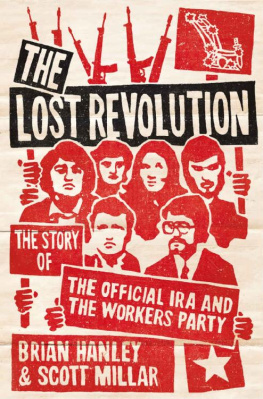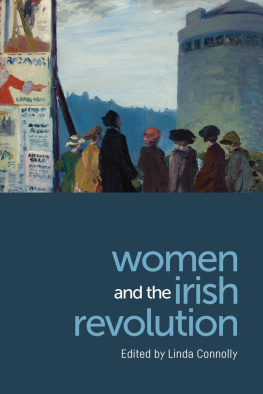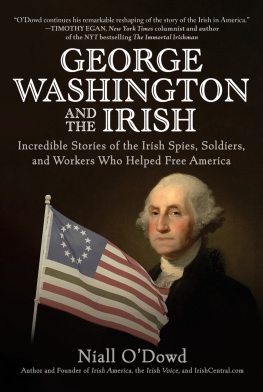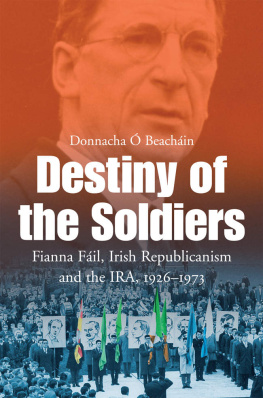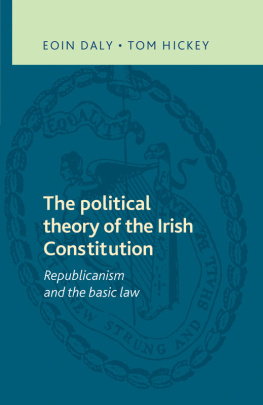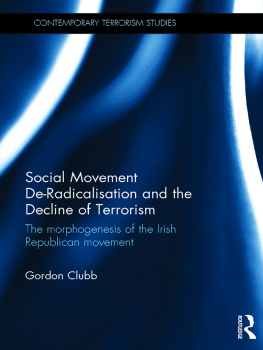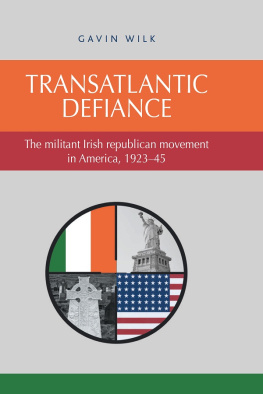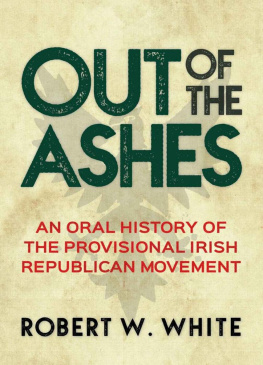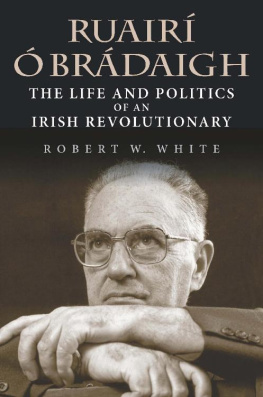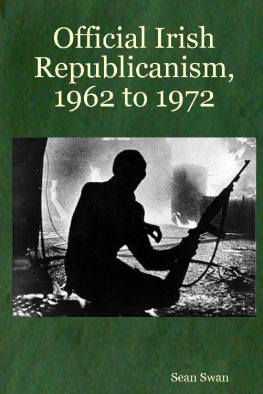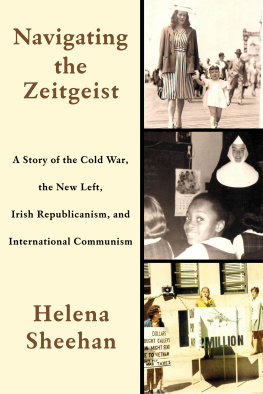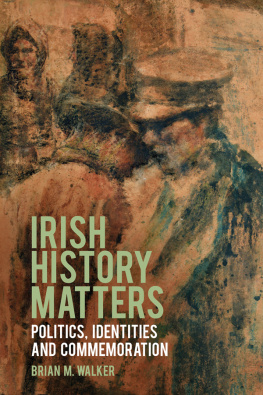The Lost Revolution
The Story of the Official IRA
and the Workers Party
BRIAN HANLEY
and SCOTT MILLER
PENGUIN
IRELAND
PENGUIN IRELAND
Published by the Penguin Group
Penguin Ireland, 25 St Stephens Green, Dublin 2, Ireland
(a division of Penguin Books Ltd)
Penguin Books Ltd, 80 Strand, London WC2R 0RL , England
Penguin Group (USA) Inc., 375 Hudson Street, New York, New York 10014, USA
Penguin Group (Australia), 250 Camberwell Road, Camberwell, Victoria 3124, Australia
(a division of Pearson Australia Group Pty Ltd)
Penguin Group (Canada), 90 Eglinton Avenue East, Suite 700, Toronto, Ontario, Canada M4P 2Y3
(a division of Pearson Penguin Canada Inc.)
Penguin Books India Pvt Ltd, 11 Community Centre, Panchsheel Park, New Delhi 110 017, India
Penguin Group (NZ), 67 Apollo Drive, Rosedale, North Shore 0632, New Zealand
(a division of Pearson New Zealand Ltd)
Penguin Books (South Africa) (Pty) Ltd, 24 Sturdee Avenue, Rosebank, Johannesburg 2196, South Africa
Penguin Books Ltd, Registered Offices: 80 Strand, London WC2R 0RL , England
www.penguin.com
First published 2009
Copyright Brian Hanley and Scott Millar, 2009
The moral right of the authors has been asserted
All rights reserved
Without limiting the rights under copyright
reserved above, no part of this publication may be
reproduced, stored in or introduced into a retrieval system,
or transmitted, in any form or by any means (electronic, mechanical,
photocopying, recording or otherwise), without the prior
written permission of both the copyright owner and
the above publisher of this book
ISBN: 978-0-14-193501-0
In memory of Una Hanley 19441989
and
in memory of Diarmuid OLeary 19761998
Contents
Prologue
25 November 2005
The clapping and cheering died down and the throng around the bar went quiet as the stocky 71-year-old man mounted the stage.Restrained emotion was evident on his face as he gripped a handful of notes and prepared to begin his speech. Approximately150 people had gathered in the basement hall of the Teachers Club in Dublins Parnell Square. Outside sleet fell on a coldNovember night. Inside the atmosphere was more akin to a family reunion than a political meeting. The mainly middle-aged audiencewarmly greeted performances of ballads that celebrated the struggle for Irish independence and international socialism.
Sean Garland, the president of the Workers Party of Ireland, began his address. His speech was delivered without formality,in an unmistakably Dublin accent. Garland condemned his arrest, seven weeks previously in Belfast, on foot of a United Stateswarrant accusing him of aiding the North Korean government of Kim Jong-il in an international multi-million super-dollarcounterfeiting scam. He praised the efforts of those gathered to bring attention to the arrest, which occurred on the eveof his partys annual conference. He berated the Police Service of Northern Ireland for doing the dirty work of the UnitedStates Secret Service and the so-called neo-cons who ruled that country. Warming to his theme, he denounced Tony Blair andSilvio Berlusconi as the willing lackeys of George Bushs regime, which was set upon the domination of the world. He remindedthe audience, who greeted his more intemperate remarks with claps and cheers, of the anti-imperialist struggles of the last50 years that had pitted revolutionaries against the agents of the United States across the globe. In the process he dismissedthe so-called new democracies of the former Eastern Bloc for their subservience to the US and their complicity in the secret torture prisons of the CIA.
Closing his speech, Garland outlined the career of late US civil rights lawyer Arthur Kinoy, who had defended those accusedof communist sympathies in the 1950s, including Ethel and Julius Rosenberg, executed in 1953 for passing US nuclear secretsto the USSR. Garland quoted from a speech of Kinoys: I will never quit. I am old and small, but I will not stop becauseI know what I am doing and the others do not. And I believe in what I am doing and the others believe in nothing and feareverything. Garland added that this statement stands as testimony to all those who have gone before us throughout the worldwho have lived their lives by the principles of Arthur Kinoy and to those who continue his and our struggle today. We cando no better than to follow the example of our fellow comrade US citizen Arthur Kinoy. Garland then left the stage to cheersand clenched-fist salutes.
Initially organized as a folk concert to raise funds for the Stop the Extradition of Sean Garland campaign, the event hadtaken on a more celebratory air since Garland had travelled south of the border on the grounds that he required medical tests,and then announced that he would not be returning to Belfast for an extradition hearing, claiming that he would not receivea fair trial. Instead he declared that he would place himself under the protection of my own government and my countrysconstitution which will guarantee me basic human rights and freedoms. In the process he forfeited 30,000 in bail.
The US indictment outlined a case officially titled The United States of America v Sean Garland, aka The Man With The Hat.US agencies claimed that they had evidence of the central role the elderly Irishman played in an attempt to undermine theUS economy. The indictment also identified Garland as Chief of Staff of the Official Irish Republican Army. It alleged a conspiracyinvolving former KGB agents, the North Korean secret service, British criminals and members of the Official IRA. Garlandsnetwork was said to have distributed $29 million worth of high-quality forged $100 bills that had been printed in a secret location in North Korea. According to the indictment, the US authoritieshad first become aware of a possible Irish connection in the early 1990s, when Irish banks had stopped handling over-the-countertransactions of $100 bills because of the number of forged notes in circulation.
The people among whom Garland circulated following his speech were not concerned by these accusations. They were in the mainthe loyal remnants of a party that had once aspired to political power in Ireland. These men and women, unlike many in a countrystruggling to come to terms with the aspirations brought about by a dramatic economic boom, took pride in the designationworking class. No matter how small and politically obsolete the Workers Party of 2005 appeared, for the faithful few gatheredin this hall they were the true inheritors of the Irish revolutionary tradition stretching back to the United Irishmen in1798 and continuing on through the IRA that fought against British rule after 1916.
Like a number of his comrades gathered in Parnell Square that night, Sean Garland was a child of north Dublin. Born in 1934,he was raised in one room of a run-down tenement at 7 Belvedere Place as one of nine children, some of whom died in childhood.He was educated by the Christian Brothers, then worked as a messenger boy and a bar help. He joined the IRA in June 1953 aftermaking contact with them through the United Irishman newspaper. Like most of his comrades, Garland had joined the republican movement driven by a belief that Irelands greatestill was partition. Stencilled slogans on the dilapidated walls of Dublin declared Freedom calls: join the IRA, while songsrecounting the glories of the patriot dead were sung in pubs and learned by children. To remove the border and unite thecountry was, Garland recalls, the only aim.
Between 1956 and 1962 Garland and his IRA comrades had attempted to achieve this aim, in the so-called Border Campaign, whichended with an order to dump arms in February 1962. That order was to be the starting point of a political odyssey for Garlandand for Toms Mac Giolla, who became president of Sinn Fin in that year. Mac Giolla would serve on the IRA Army Council withGarland during the 1960s, and side with him in 1969 when the republican movement split into Official and Provisional wings.As Garland sat beside the 81-year-old Mac Giolla in the Teachers Club, they may have dwelt on memories of comrades from timespast as the band struck up Sean South. Garland sat quietly as many in the crowd joined in with the chorus of the song thatrecalled that day in January 1957 when an IRA column of fourteen men under Garlands command attacked an RUC barracks in Brookeborough,County Fermanagh. The raid left Sean South and Fergal OHanlon dead, and Garland, among others, badly injured. From the jawsof this defeat the republican movement, as it had done many times before, drew a moral victory. Outpourings of nationalistsentiment at the young mens deaths resulted in thousands of people lining the streets for Souths funeral cortge and fora time restored the IRAs position as idealistic heroes in the eyes of many. The raid also consolidated Garlands positionas a man of action within the IRA.

